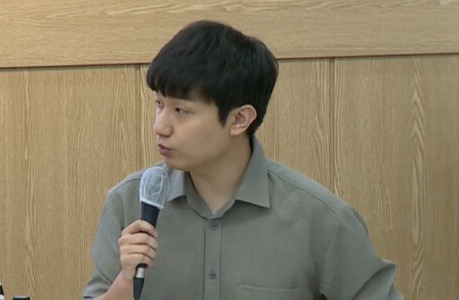After various steps to make resigned trainee doctors return to work have failed, calls are mounting for junior doctors to sit at the dialogue table with the government.
Those who advocate dialogue say the two sides must first sit down together to discuss structural problems, including how to provide essential care more effectively and improve treatment for interns and residents.
However, trainee doctors discuss (the government’s) “attitude issues”. "You are wasting your time even if you sit face-to-face with those who never acknowledge their faults, merely saying, 'I'm not wrong,’” a trainee doctor said at a forum on Thursday.

Park Jae-il, a medical resident who resigned from Seoul National University Hospital, remarked so at a debate organized by the emergency committee of the faculty council of the Seoul National University College of Medicine and Seoul National University Hospital on “Transforming the Structure of Advanced General Hospitals and Specialist-Centered Hospitals.”
"No one can order trainee doctors to come back. They must create a situation where each trainee doctor can agree to return," Park said. He has led the Seoul National University Hospital's trainee doctors’ emergency council and its emergency committee.
When asked whether trainee doctors should sit down at the dialogue table with the government to address "fundamental issues," including soaring medical expenses and avoidance of some specialties, Park said it is the government that ignores the fundamentals when dealing with healthcare policy, stressing that it must change such attitudes.
"From the beginning, we pointed out procedural problems in the healthcare policy-making process and a lack of sufficient explanation to the medical community and the public,” Park said. "No one still knows how the number 2,000 came about. Yet, the government takes the increase of the medical school enrollment quota for granted, asking that if it reduces the number to 1,500, will it bring trainee doctors back to work?”
He said the government should acknowledge this and "reflect on itself,"
Park added that such an attitude is not necessarily limited to healthcare policy. He emphasized that the government needs to change "fundamentally” the way it makes policies and consults. "If the policy is wrong in reasoning and procedure, the government should admit it and show the willingness to withdraw it," he said.
"The government needs to come into the conversation with this attitude, and not just see it as the arrogance of certain groups in the medical community,” he said. "At a fundamental level, we ask the government to recognize the wrong policies and reflect on how to solve the problem. If it takes these steps, we can find a solution to this crisis."
Related articles
- Trainee doctors’ application rate plummets to a devastating 0.8% for H2
- Cardiothoracic surgery faces collapse: only 12 trainees left after 95 resign in protest of government policy
- Professors petition parliamentary probe into ‘why 2000 more medical students’
- Medical professors boycott recruiting interns for ‘popular’ departments
- Confusion worsens as government accepts medical exam applications despite student boycott
- Government and hospitals agree on the need to make better use of nurses
- National university hospitals lost 223 doctors in the first half-year

